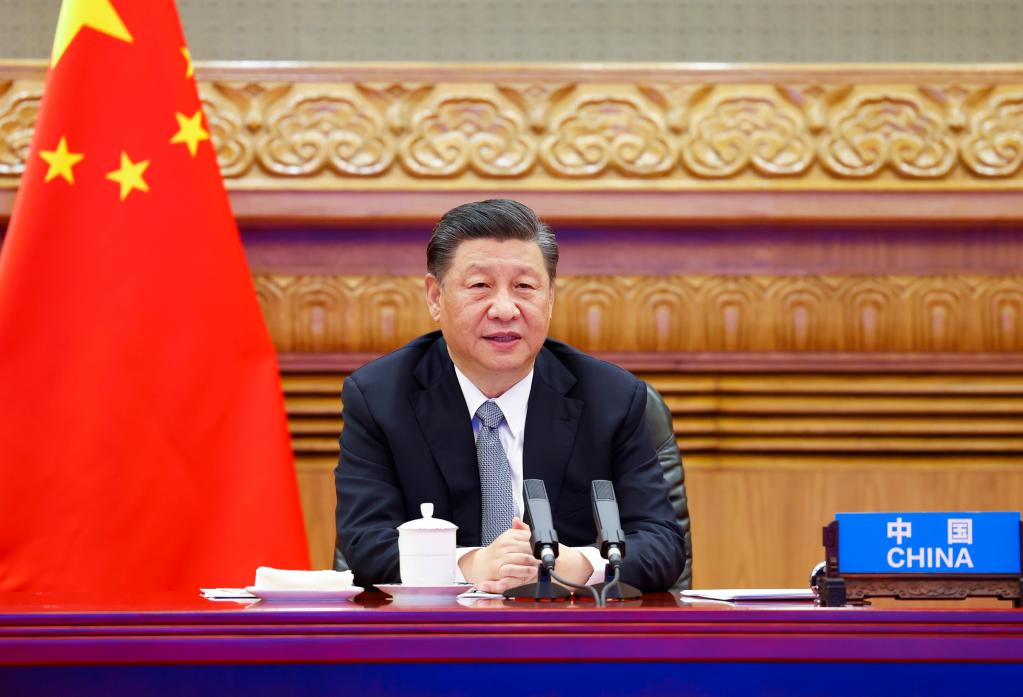Full Text: Remarks by Chinese President Xi Jinping at Leaders Summit on Climate
At the invitation of U.S. President Joe Biden, Chinese President Xi Jinping attends the Leaders Summit on Climate via video link and delivers an important speech titled "For Man and Nature: Building a Community of Life Together" in Beijing, capital of China, April 22, 2021. (Xinhua/Huang Jingwen)
BEIJING, April 22 (Xinhua) -- Chinese President Xi Jinping delivered a speech at the Leaders Summit on Climate via video link from Beijing on Thursday.
Please see the attachment for the translation of the full text of the speech.
Full Text: Remarks by Chinese President Xi Jinping at Leaders Summit on Climate
For Man and Nature: Building a Community of Life Together
Remarks by H.E. Xi Jinping
President of the People’s Republic of China
At the Leaders Summit on Climate
22 April 2021
Honorable President Joe Biden,
Honorable Colleagues,
It is a great pleasure to join you at the Leaders Summit on Climate on Earth Day. I wish to thank President Biden for the kind invitation. It is good to have this opportunity to have an in-depth exchange of views with you on climate change, and to discuss ways to tackle this challenge and find a path forward for man and Nature to live in harmony.
Since time of the industrial civilization, mankind has created massive material wealth. Yet, it has come at a cost of intensified exploitation of natural resources, which disrupted the balance in the Earth’s ecosystem, and laid bare the growing tensions in the human-Nature relationship. In recent years, climate change, biodiversity loss, worsening desertification and frequent extreme weather events have all posed severe challenges to human survival and development. The ongoing COVID-19 pandemic has added difficulty to economic and social development across countries. Faced with unprecedented challenges in global environmental governance, the international community needs to come up with unprecedented ambition and action. We need to act with a sense of responsibility and unity, and work together to foster a community of life for man and Nature.
— We must be committed to harmony between man and Nature. “All things that grow live in harmony and benefit from the nourishment of Nature.” Mother Nature is the cradle of all living beings, including humans. It provides everything essential for humanity to survive and thrive. Mother Nature has nourished us, and we must treat Nature as our root, respect it, protect it, and follow its laws. Failure to respect Nature or follow its laws will only invite its revenge. Systemic spoil of Nature will take away the foundation of human survival and development, and will leave us human beings like a river without a source and a tree without its roots. We should protect Nature and preserve the environment like we protect our eyes, and endeavor to foster a new relationship where man and Nature can both prosper and live in harmony.
— We must be committed to green development. Green mountains are gold mountains. To protect the environment is to protect productivity, and to improve the environment is to boost productivity — the truth is as simple as that. We must abandon development models that harm or undermine the environment, and must say no to shortsighted approaches of going after near-term development gains at the expense of the environment. Much to the contrary, we need to ride the trend of technological revolution and industrial transformation, seize the enormous opportunity in green transition, and let the power of innovation drive us to upgrade our economic, energy and industrial structures, and make sure that a sound environment is there to buttress sustainable economic and social development worldwide.
— We must be committed to systemic governance. Mountains, rivers, forests as well as farmlands, lakes, grasslands and deserts all make indivisible parts of the ecosystem. Protecting the ecosystem requires more than a simplistic, palliative approach. We need to follow the innate laws of the ecosystem and properly balance all elements and aspects of Nature. This is a way that may take us where we want to be, an ecosystem in sound circulation and overall balance.
— We must be committed to a people-centered approach. The environment concerns the well-being of people in all countries. We need to take into full account people’s longing for a better life and a good environment as well as our responsibility for future generations. We need to look for ways to protect the environment, grow the economy, create jobs and remove poverty all at the same time, so as to deliver social equity and justice in the course of green transition and increase people’s sense of benefit, happiness and security.
— We must be committed to multilateralism. We need to work on the basis of international law, follow the principle of equity and justice, and focus on effective actions. We need to uphold the UN-centered international system, comply with the objectives and principles laid out in the UN Framework Convention on Climate Change (UNFCCC) and its Paris Agreement, and strive to deliver the 2030 Agenda for Sustainable Development. We need to each take stronger actions, strengthen partnerships and cooperation, learn from each other and make common progress in the new journey toward global carbon neutrality. In this process, we must join hands, not point fingers at each other; we must maintain continuity, not reverse course easily; and we must honor commitments, not go back on promises.
China welcomes the United States’ return to the multilateral climate governance process. Not long ago, the Chinese and US sides released a Joint Statement Addressing the Climate Crisis. China looks forward to working with the international community including the United States to jointly advance global environmental governance.
— We must be committed to the principle of common but differentiated responsibilities. The principle of common but differentiated responsibilities is the cornerstone of global climate governance. Developing countries now face multiple challenges to combat COVID-19, grow the economy, and address climate change. We need to give full recognition to developing countries’ contribution to climate action and accommodate their particular difficulties and concerns. Developed countries need to increase climate ambition and action. At the same time, they need to make concrete efforts to help developing countries strengthen the capacity and resilience against climate change, support them in financing, technology, and capacity building, and refrain from creating green trade barriers, so as to help developing countries accelerate the transition to green and low-carbon development.
Colleagues,
The Chinese civilization has always valued harmony between man and Nature as well as observance of the laws of Nature. It has been our constant pursuit that man and Nature could live in harmony with each other. Ecological advancement and conservation have been written into China’s Constitution and incorporated into China’s overall plan for building socialism with Chinese characteristics. China will follow the Thought on Ecological Civilization and implement the new development philosophy. We will aim to achieve greener economic and social development in all aspects, with a special focus on developing green and low-carbon energy. We will continue to prioritize ecological conservation and pursue a green and low-carbon path to development.
Last year, I made the official announcement that China will strive to peak carbon dioxide emissions before 2030 and achieve carbon neutrality before 2060. This major strategic decision is made based on our sense of responsibility to build a community with a shared future for mankind and our own need to secure sustainable development. China has committed to move from carbon peak to carbon neutrality in a much shorter time span than what might take many developed countries, and that requires extraordinarily hard efforts from China. The targets of carbon peak and carbon neutrality have been added to China’s overall plan for ecological conservation. We are now making an action plan and are already taking strong nationwide actions toward carbon peak. Support is being given to peaking pioneers from localities, sectors and companies. China will strictly control coal-fired power generation projects, and strictly limit the increase in coal consumption over the 14th Five-Year Plan period and phase it down in the 15th Five-Year Plan period. Moreover, China has decided to accept the Kigali Amendment to the Montreal Protocol and tighten regulations over non-carbon dioxide emissions. China’s national carbon market will also start trading.
As a participant, contributor and trailblazer in global ecological conservation, China is firmly committed to putting multilateralism into action and promoting a fair and equitable system of global environmental governance for win-win cooperation. China will host COP15 to the Convention on Biological Diversity this October and looks forward to working with all parties to enhance global governance on biodiversity. We support COP26 to the UNFCCC in achieving positive outcomes. As we in China often say, “It is more important to show people how to fish than just giving them fish.” China has done its best to help developing countries build capacity against climate change through various forms of results-oriented South-South cooperation. From remote sensing satellites for climate monitoring in Africa to low-carbon demonstration zones in Southeast Asia and to energy-efficient lights in small island countries, such cooperation has yielded real, tangible and solid results. China has also made ecological cooperation a key part of Belt and Road cooperation. A number of green action initiatives have been launched, covering wide-ranging efforts in green infrastructure, green energy, green transport and green finance, to bring enduring benefits to the people of all Belt and Road partner countries.
Colleagues,
As we say in China, “When people pull together, nothing is too heavy to be lifted.” Climate change poses pressing, formidable and long-term challenges to us all. Yet I am confident that as long as we unite in our purposes and efforts and work together with solidarity and mutual assistance, we will rise above the global climate and environment challenges and leave a clean and beautiful world to future generations.
Thank you.
 |
Photos
Related Stories
- China's commitment to overcoming climate change important to global cooperation, experts say
- Xi calls for "unprecedented ambition, action" to build community of life
- U.S. climate envoy's China visit revives bilateral cooperation on climate change: media
- Interview: China's commitments on climate change "hugely significant": U.S. expert
- Climate change, overfishing taking toll on world's fish supply, warn Australian researchers
Copyright © 2021 People's Daily Online. All Rights Reserved.











